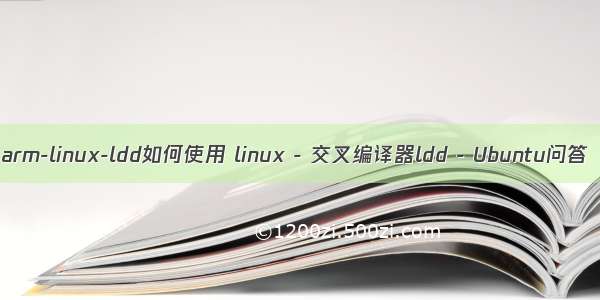
问题描述
我创建了一个交叉编译的arm可执行文件。我想找到可执行文件的库依赖项。我正在使用ubuntu natty并安装了arm-linux-gnueabi工具链,其中不包含ldd。有没有可用的工具来查看Linux中arm可执行文件库的依赖性。
最佳方法
这有点混乱,但这是我能找到的最佳解决方案,并且对于基本使用而言确实非常有效-只需使用其他交叉工具将此脚本另存为”arm-none-linux-gnueabi-ldd”即可。
#!/bin/sh
arm-none-linux-gnueabi-readelf -a $1 | grep "Shared library:"
次佳方法
您也可以使用objdump和,以便仅转储和搜索二进制文件的标头部分。这可以节省您几毫秒的时间…
#!/bin/sh
arm-none-linux-gnueabi-objdump -x $1 | grep NEEDED
第三种方法
这是另一个选项,您可以将LD_TRACE_LOADED_OBJECTS环境变量设置为任何值,例如1,然后您只需运行可执行文件,输出应该是其动态依赖项。
第四种方法
我发现了这一点,并希望它可以为仍在寻找真正的LDD解决方案的许多人提供帮助。 ldd只是一个支持ld-linux库的脚本。那么,为什么不制作自己的ldd脚本呢?首先,您需要在系统中找到ld-linux库,该库应该可用。就我而言,它是/lib/ld-linux-armhf.so.3,因此我将其放入RTLDLIST中,如下面的脚本所示。
并将此脚本放入设备或开发板中,您可以使用ldd,这对于查找可执行文件的依赖库非常方便。
祝好运!
#! /bin/bash
# Copyright (C) 1996-, Free Software Foundation, Inc.
# This file is part of the GNU C Library.
# The GNU C Library is free software; you can redistribute it and/or
# modify it under the terms of the GNU Lesser General Public
# License as published by the Free Software Foundation; either
# version 2.1 of the License, or (at your option) any later version.
# The GNU C Library is distributed in the hope that it will be useful,
# but WITHOUT ANY WARRANTY; without even the implied warranty of
# MERCHANTABILITY or FITNESS FOR A PARTICULAR PURPOSE. See the GNU
# Lesser General Public License for more details.
# You should have received a copy of the GNU Lesser General Public
# License along with the GNU C Library; if not, write to the Free
# Software Foundation, Inc., 59 Temple Place, Suite 330, Boston, MA
# 02111-1307 USA.
# This is the `ldd' command, which lists what shared libraries are
# used by given dynamically-linked executables. It works by invoking the
# run-time dynamic linker as a command and setting the environment
# variable LD_TRACE_LOADED_OBJECTS to a non-empty value.
# We should be able to find the translation right at the beginning.
TEXTDOMAIN=libc
TEXTDOMAINDIR=/usr/share/locale
RTLDLIST="/lib/ld-linux.so.2 /lib64/ld-linux-x86-64.so.2 /lib/ld-linux-armhf.so.3"
warn=
bind_now=
verbose=
while test $# -gt 0; do
case "$1" in
--vers | --versi | --versio | --version)
echo 'ldd (Ubuntu EGLIBC 2.15-0ubuntu10.3) 2.15'
printf $"Copyright (C) %s Free Software Foundation, Inc.
This is free software; see the source for copying conditions. There is NO
warranty; not even for MERCHANTABILITY or FITNESS FOR A PARTICULAR PURPOSE.
" ""
printf $"Written by %s and %s.
" "Roland McGrath" "Ulrich Drepper"
exit 0
;;
--h | --he | --hel | --help)
printf $"Usage: ldd [OPTION]... FILE...
--help print this help and exit
--version print version information and exit
-d, --data-relocs process data relocations
-r, --function-relocs process data and function relocations
-u, --unused print unused direct dependencies
-v, --verbose print all information
"
printf $"For bug reporting instructions, please see:
%s.
" ""
exit 0
;;
-d | --d | --da | --dat | --data | --data- | --data-r | --data-re | \
--data-rel | --data-relo | --data-reloc | --data-relocs)
warn=yes
shift
;;
-r | --f | --fu | --fun | --func | --funct | --functi | --functio | \
--function | --function- | --function-r | --function-re | --function-rel | \
--function-relo | --function-reloc | --function-relocs)
warn=yes
bind_now=yes
shift
;;
-v | --verb | --verbo | --verbos | --verbose)
verbose=yes
shift
;;
-u | --u | --un | --unu | --unus | --unuse | --unused)
unused=yes
shift
;;
--v | --ve | --ver)
echo >&2 $"ldd: option \`$1' is ambiguous"
exit 1
;;
--) # Stop option processing.
shift; break
;;
-*)
echo >&2 'ldd:' $"unrecognized option" "\`$1'"
echo >&2 $"Try \`ldd --help' for more information."
exit 1
;;
*)
break
;;
esac
done
nonelf ()
{
# Maybe extra code for non-ELF binaries.
return 1;
}
add_env="LD_TRACE_LOADED_OBJECTS=1 LD_WARN=$warn LD_BIND_NOW=$bind_now"
add_env="$add_env LD_LIBRARY_VERSION=\$verify_out"
add_env="$add_env LD_VERBOSE=$verbose"
if test "$unused" = yes; then
add_env="$add_env LD_DEBUG=\"$LD_DEBUG${LD_DEBUG:+,}unused\""
fi
# The following use of cat is needed to make ldd work in SELinux
# environments where the executed program might not have permissions
# to write to the console/tty. But only bash 3.x supports the pipefail
# option, and we don't bother to handle the case for older bash versions.
if x=`set -o` && test "$x" != "${x#*pipefail}" && set -o pipefail ; then
try_trace() {
eval $add_env '"$@"' | cat
}
else
try_trace() {
eval $add_env '"$@"'
}
fi
case $# in
0)
echo >&2 'ldd:' $"missing file arguments"
echo >&2 $"Try \`ldd --help' for more information."
exit 1
;;
1)
single_file=t
;;
*)
single_file=f
;;
esac
result=0
for file do
# We don't list the file name when there is only one.
test $single_file = t || echo "${file}:"
case $file in
*/*) :
;;
*) file=./$file
;;
esac
if test ! -e "$file"; then
echo "ldd: ${file}:" $"No such file or directory" >&2
result=1
elif test ! -f "$file"; then
echo "ldd: ${file}:" $"not regular file" >&2
result=1
elif test -r "$file"; then
RTLD=
ret=1
for rtld in ${RTLDLIST}; do
if test -x $rtld; then
verify_out=`${rtld} --verify "$file"`
ret=$?
case $ret in
[02]) RTLD=${rtld}; break;;
esac
fi
done
case $ret in
0|2)
try_trace "$RTLD" "$file" || result=1
;;
1|126)
# This can be a non-ELF binary or no binary at all.
nonelf "$file" || {
echo $" not a dynamic executable"
result=1
}
;;
*)
echo 'ldd:' ${RTLD} $"exited with unknown exit code" "($ret)" >&2
exit 1
;;
esac
else
echo 'ldd:' $"error: you do not have read permission for" "\`$file'" >&2
result=1
fi
done
exit $result
# Local Variables:
# mode:ksh
# End:
参考资料














